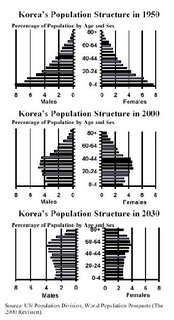I just read Rick Ruffin's article about birthrates and the previous article he was commenting on. Korea has an amazingly low birthrate and the two articles discuss whether this is good or bad. The first article makes the case that Korea is reaching a dangerously lopsided ratio of employed population to total population. The few of employable age will need to pay greater and greater taxes to maintain the elderly.
The most outstanding problem with low birthrates is it increases the ratio of old people to young people. It spawns an awesome situation of a shrinking labor force. The reduction in the number of taxpayers is set to cause the collapse of various welfare funds on which a growing number of elderly rely. The situation is serious enough to threaten existence of the nation itself.
Ruffin's reply is that reducing the population by having fewer children is the best way to reduce overcrowding, pollution, farm-field exhaustion and other problems.
Almost every environmental problem- and most social and political problems throughout the world today- are because of human population increase. Pollution, famine, pestilence, over-development and war can all be attributed to high concentrations of humans. And you are encouraging everyone to have more kids! You are concerned that there will not be enough people paying into the "system" to support the increasing aging population. Well I say the money saved from not having to deal with pollution and waste created by too many people can more than make up for the money needed to support all the grandmothers and grandfathers soon to appear on the scene.
Reducing the population through reducing the number of children per family does sound like one of the most benign ways to protect the environment but it all comes down to numbers.
Some numbers can be found in a pdf at 'weforum'. There, I
 found, "Korea will need to figure out how to support a growing inactive population with fewer workers. As shown in the figure above, if Korea maintains its current activity rates between 2000 and 2030, the ratio of workers to retirees is expected to plummet from nearly 7.1 to 2.7."
found, "Korea will need to figure out how to support a growing inactive population with fewer workers. As shown in the figure above, if Korea maintains its current activity rates between 2000 and 2030, the ratio of workers to retirees is expected to plummet from nearly 7.1 to 2.7."Click on the picture for a larger view of the population pyramid.
I have no basis for comparison to the ratio of nearly three workers to one retiree but the ratio for children is absent. Naturally, there will still be some children even with the small birthrate and they will also need care.
Korea of 2030 may continue to be viable with these ratios but it will have even less breathing room. There will be less surplus and a big surplus is needed considering our neighbor to the north. Should reunification happen, caring for the North Koreans will be difficult now; in the near future, it will be all but impossible.
There is another way to look at the decreasing birthrate. There will be fewer 'pureblooded' Koreans. I do not feel this is bad in itself and I don't want to belittle my own son's racial mixture but the broader perspective is that the world is 'samifying'. The world culture is already becoming western and the world's people are losing their distinctiveness. Koreans and Indians choose to wear western suits rather than hanboks or saris. McDonalds is everywhere...
Anyway, there is a book describing how the world's cultures are becoming more similar. I have only listened to the interview but the book can be found here.
I do agree that if the world's population can be kept stable, or preferably, drop slightly but steadily for a few generations, the world will be a better place. It just seems to me that Korea is experiencing a precipitious drop rather than the gentle one that would allow greater longterm stability.
I don't know if this next article, in the Times the same day as Raffin's article, has any relevance but it is ironic to find the two together.
The article describes a Kyongsang family with 12 children. An excerpt:
A church pastor and his wife living in Kumi, North Kyongsang Province, gave birth to their 12th child Sunday, adding another member to their already large family. Rev. Kim Suk-tae, 47, and his wife Um Kye-suk, 42, a couple married for 20 years, will now shepherd the country's largest single family.
Here is one couple that should be well-taken-care-of when they retire!




2 comments:
Brian:
My name is Ruffin. Not Raffin. You know that.
Okay.
The reason Korea's population is dropping faster than that of any other nation is that is climbed faster than that of any other nation.
Sure, more old people need more money to support them. But we are humans, and we are smart, and there are ways to support the old people without making new young people.
Have you tried walking down the sidewalk in front of Seoul's Dongdaemun Oodongjang Stadium ANY DAY OF THE WEEK?!
It's impossible.
Yankabroad,
First, my sincere apologies. I do know that your name is Ruffin and I am sorry for the typo. Please accept that it was a typo and not some kind of attack.
I actually agree that a negative growthrate would be prefered, just not the extreme one Korea currently has.
On the other hand, I have one child and no interest in more so maybe I am hypocritical on the subject - if I want a higher birthrate, I should have more children and they are just too much work!
Post a Comment